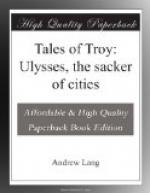Ulysses slept in more than one temple, and once in that of Pallas Athene, and the priests and priestesses were kind to him, and gave him food in the morning when the gates of the temple were opened.
In the temple of Pallas Athene, where the Luck of Troy lay always on her altar, the custom was that priestesses kept watch, each for two hours, all through the night, and soldiers kept guard within call. So one night Ulysses slept there, on the floor, with other distressed people, seeking for dreams from the Gods. He lay still all through the night till the turn of the last priestess came to watch. The priestess used to walk up and down with bare feet among the dreaming people, having a torch in her hand, and muttering hymns to the Goddess. Then Ulysses, when her back was turned, slipped the gold phial out of his rags, and let it lie on the polished floor beside him. When the priestess came back again, the light from her torch fell on the glittering phial, and she stooped and picked it up, and looked at it curiously. There came from it a sweet fragrance, and she opened it, and tasted the drug. It seemed to her the sweetest thing that ever she had tasted, and she took more and more, and then closed the phial and laid it down, and went along murmuring her hymn.
But soon a great drowsiness came over her, and she sat down on the step of the altar, and fell sound asleep, and the torch sunk in her hand, and went out, and all was dark. Then Ulysses put the phial in his wallet, and crept very cautiously to the altar, in the dark, and stole the Luck of Troy. It was only a small black mass of what is now called meteoric iron, which sometimes comes down with meteorites from the sky, but it was shaped like a shield, and the people thought it an image of the warlike shielded Goddess, fallen from Heaven. Such sacred shields, made of glass and ivory, are found deep in the earth in the ruined cities of Ulysses’ time. Swiftly Ulysses hid the Luck in his rags and left in its place on the altar a copy of the Luck, which he had made of blackened clay. Then he stole back to the place where he had lain, and remained there till dawn appeared, and the sleepers who sought for dreams awoke, and the temple gates were opened, and Ulysses walked out with the rest of them.
He stole down a lane, where as yet no people were stirring, and crept along, leaning on his staff, till he came to the eastern gate, at the back of the city, which the Greeks never attacked, for they had never drawn their army in a circle round the town. There Ulysses explained to the sentinels that he had gathered food enough to last for a long journey to some other town, and opened his bag, which seemed full of bread and broken meat. The soldiers said he was a lucky beggar, and let him out. He walked slowly along the waggon road by which wood was brought into Troy from the forests on Mount Ida, and when he found that nobody was within sight he slipped into




